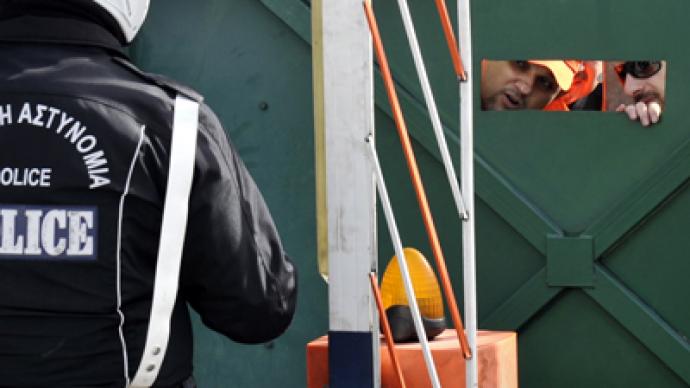Greek riot police put end to Metro workers sit-in

Police stormed a Metro depot in Athens occupied by subway workers who refused to go to work for nine consecutive days. On Friday all public transport workers in the Greek capital joined the strike, putting the city on the verge of transport collapse.
Police officers raided a subway train depot in western Athens where some 90 workers barricaded themselves on Thursday. The operation started before dawn, right after 4am, when a crew of around 100 officers stormed the barricaded gates while riot police blocked off the facility to prevent other workers that started gathering near the depot from getting in.The protesters were dispersed, with no fewer than 10 of them were detained for resisting in force. One woman has been hospitalized with slight injuries.For nine days Metro workers have been protesting against austerity measures taken by the conservative-led Greek government as demanded by the foreign sponsors of Greece’s bailout plan. A unified wage scheme for public sector workers proposed by the government would slash their salaries by at least 25 per cent.Protesters, joined by bus, tram and railway workers in solidarity on Friday, refuse to return to work despite harsh emergency legislation under which they could face five years in jail.So far no one has been arrested under the emergency law as the authorities are reluctant to escalate the protests even further.
The deep recession Greece has been in since 2009 brought unemployment level to a record 26 per cent in 2012. As EU lenders agreed to bail out the Greek economy in return for the introduction of severe austerity measures, the country’s government has had to adopt considerable budget cuts leading to salary slashes. These austerity measures are hugely unpopular – to say the least – among public sector workers, outraged by government plans to scrap their existing contracts.Greece has a special wartime-like civil mobilization law to manage non-war emergencies. Amended in 2007, the law empowers authorities to dismiss laborers on strike. Those protesting with force can be arrested and jailed.
Greek trade unions and left opposition says the government uses dictatorial methods to tame the protesting working class.“The government is dressed in khaki. It's a new coup against this country's constitution to mobilize working people on strike on the subway with military-style methods to try and break their struggle,” lawmaker of left opposition Syriza party Dimitris Stratoulis told AP on Thursday. “The aim of the government is to scrap collective wage bargaining rights for a China-style reform of labor rights for workers in the private and public sector.”But Greek Finance Minister Yiannis Stournaras has a different view on slashing salaries.“In some public corporations, workers with elementary education are paid more than university professors,'' Stournaras said. “Nobody wants that sort of situation.”Opened in 2000, the subway in Athens transports 700,000 passengers daily, 1.1 million passengers if combined with the older network. About 40 per cent of 10.8 million Greek citizens live in greater Athens, so the scale of Friday’s transport strike will have huge negative consequences for economic life of the Greek capital.














